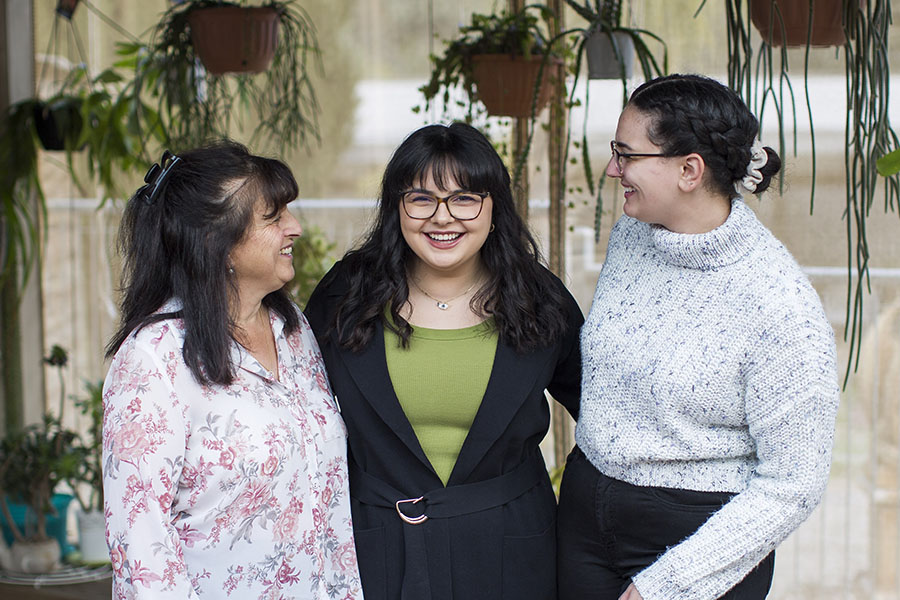This website uses cookies so that we can provide you with the best user experience possible. Cookie information is stored in your browser and performs functions such as recognising you when you return to our website and helping our team to understand which sections of the website you find most interesting and useful.
News
Jasmine’s vision for success
Jasmine hasn’t let her diagnosis of an inherited retinal disease stand in the way of her ambition to make a difference.
Like other nurses in Melbourne’s busy hospitals, Jasmine Mercieca is working hard to help save lives.
“I like working in a fast‑paced environment where you can have the biggest impact,” she says.
The only difference to many of her peers is that Jasmine has retinitis pigmentosa – a type of inherited retinal disease (IRD) that causes progressive, irreversible vision loss.
Living with an IRD
IRD is an umbrella term for a range of genetic eye diseases that cause retinal cells to stop functioning properly, leading to progressive vision loss.
More than 300 genes are associated with inherited retinal diseases.
Genetic errors can be passed down from parent to child – but they do not always result in vision loss.
This means an IRD can happen when there is no known history, as it did in the Mercieca family.
“At first, my parents felt a bit guilty, thinking they gave me the inherited disease,” she says.
At the same time, Jasmine says the whole family was behind her from day one: “Even when I see my specialist, everyone wants to be in the room.”
Her mother, Grace, says the diagnosis came as a surprise: “We took her to find a cool, new pair of glasses for her first day of high school. The optometrist noticed something right away and referred us to a specialist. That’s when we found out she had retinitis pigmentosa.”
Grace says that, coming from traditionally private families, this was a difficult process for her and husband Frank: “We all got tested, but we’ve never been able to find the link.”
Jasmine feels lucky her condition didn’t affect her much during her teens: “When you’re younger, you’re not thinking about your future. As I get older, it’s scary because I realise this is happening now.”
Even in its earliest stages, Jasmine says retinitis pigmentosa still impacts her daily life: “If I’m tired or looking at a screen a lot, my eyes get quite dry and itchy, and my vision can go very blurry.
“My peripheral vision also isn’t amazing, so I can’t drive a car. It’s frustrating because there is no public transport where I live, and I can’t travel independently.”
Retinitis pigmentosa affects Jasmine mostly at night and in dimly lit environments: “Last night, I asked Hayden, my partner, to pass my phone.
“When I thought he was ignoring me, I said: ‘Give me my phone!’ And he replied: ‘It’s right in front of you!’”
No career barrier
Fortunately, Jasmine’s vision is no barrier to being a nurse.
Her career inspiration came just after completing high school. At the time, she was studying environmental science while also caring for her 92-year-old grandfather.
“Nurses would visit to make sure he took his insulin and general care of himself. It made such an impact, I decided to study nursing instead,” she says.
Her father, Frank, says Jasmine has always wanted to help make a difference: “She even used to volunteer in the local area planting trees.”
Though naturally proud, Frank was also slightly surprised about her choice of career: “Jasmine used to be too scared to even get a needle,” he says laughing.
Since graduating in 2021, Jasmine says she’s thriving in the challenging and rewarding world of theatre nursing: “The pandemic has put pressure on junior staff, like myself, to really step up. But I’m loving it and wouldn’t do anything else.”

Natural history study
Jasmine is part of the VENTURE natural history study, led by CERA and the University of Melbourne, and says her family actively encouraged her to participate: “Mum is always texting my specialist, asking whether there’s anything I can get involved in.”
Until recently, someone diagnosed with an IRD was told that progressive and irreversible vision loss was inevitable. However, with rapid advances in gene and cell therapy research, there is hope for the future.
VENTURE study leader Associate Professor Lauren Ayton and her team aim to create a database containing information about people’s vision, genetic profile and availability to take part in clinical trials.
“This means that when new clinical trials are available, we will have people ready to take part, giving Australians access to world-leading treatment options as soon as possible,” says Associate Professor Ayton.
Hope in sight
While it’s scary living with the uncertainty of not knowing how fast her vision loss may progress, Jasmine says the support of loved ones, like Hayden, brings hope: “There are people out there who’ll care about you unconditionally – and won’t mind that your eyes are a little bit crap.”
Grace says her daughter is determined to not let retinitis pigmentosa rule her life: “It’s only now she wants to be involved in these trials because, even a few years back, she was in denial.”
Jasmine has had time to reflect and is now at peace with having retinitis pigmentosa: “That’s why I’m excited to tell my story and be part of this research because, even if it doesn’t help me, there’s a chance it will help other people. So why wouldn’t I do it?”

